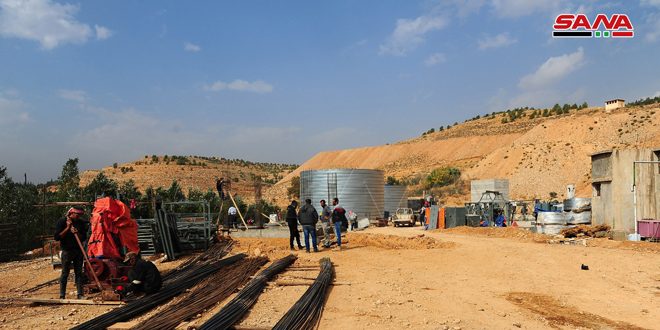Funded by the budget allocated for the reconstruction for the year 2020, which amounted to 25 billion Syrian pounds and was approved within the ministries’ emergency plan, several projects have been carried out and others are still under implementation.
Assistant Minister of Local Administration and Environment, Eng. Mu’ataz Qattan stated in a statement to SANA, that the budget has been distributed among the provinces according the need and priority of the approved projects.
In Damascus, the rehabilitation of classrooms, a textile laboratory, and the scientific sections at the textile institute have been completed at a cost of 20 million pounds.
Pollutants were removed from Barada river and sewage treatment plants were established in the regions of Jamraya, Adraa, al-Hamah at a cost of 1.8 billion pounds, according to Qattan.
Other projects have been also carried out within the emergency plan of Damascus Province, which allowed for the maintenance and restoration of al-Qadam Police Station at a cost of 25 million pounds, in addition to the rehabilitation and maintenance of the Technical Institute for Technical Observers, the vocational training center and the ministry garage at a cost of 600 million pounds.
In Damascus countryside, the projects implemented within the reconstruction budget for the current year have included the rehabilitation of the al-Hajar al-Aswad township, at a cost of more than 23 million pounds, and the completion of the rehabilitation works at Harasta Military Hospital, at a cost of 100 million pounds.
Assistant Minister of Local Administration indicated that Aleppo City would have the largest share of the reconstruction budget, as the hotel school in the province was rehabilitated at a cost of 40 million pounds, in addition to rehabilitating the cotton office rooms at a cost of 10.57 million pounds.
Qattan added that the rehabilitation works to the transmission tower at Aleppo transmission station in the al-Ansari area were completed at a cost of 70 million pounds, in addition to finishing the renovation works at the Oncology Hospital at a cost of 200 million pounds.
The two bridges of the irrigation canal on Aleppo-Raqqa highway have also been renovated at a cost of more than 139 million pounds, in addition to the rehabilitation of Dar al-Assad building in the al-Sabi’a Bahrat area in Aleppo, at a cost of 60 million pounds.
Qattan said that the projects approved by the specific emergency Plan of Homs province, included the rehabilitation and maintenance projects of the Technical Institute for Technical Observers and the Vocational Training Center, at a cost of 500 million pounds, in addition to repairing damages in the buildings of the vocational training centers complex at a value of 2 million pounds, and the renovation and rehabilitation of the northern block of the employee residential center in Bayyada neighborhood at a cost of more than 16.68 million pounds.
Other projects have been implemented in Idleb province, the most important of which are the rehabilitation of the two fodder centers in Sinjar and Abu Dohour, at a cost of 15.76 million pounds, and building projects for the headquarters of the municipalities of Tel al-Karram, Siraa and Abu Daly, at a cost of 180 million pounds, according to Qattan.
In Deir ez-Zor, the Assistant Minister of Local Administration and Environment stated that the implemented projects included the renovation of the Deir ez-Zor Education Directorate building at a cost of 245 million pounds and renovation of the first and the second university residential units at a cost of 301 million pounds, adding that the restoration of some buildings at the Nassib border crossing in Daraa city was among the most important projects in the province.
The projects implemented in Lattakia and Tartous provinces included the rehabilitation and restoration of the old branch of the General Company for Construction and Reconstruction to become new headquarters for one of the faculties and a residential unit for female students in Tartous at a cost of 150 million pounds.
This article was edited by The Syrian Observer. The Syrian Observer has not verified the content of this story. Responsibility for the information and views set out in this article lies entirely with the author.


